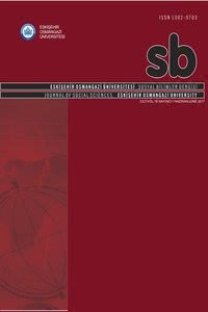Üniversite Takımlarında Mücadele Eden Sporcuların Spora Katılım Motivasyonlarına Etki Eden Faktörlerin Belirlenmesi (Eskişehir Osmangazi Üniversitesi Örneği)
Bu araştırma; üniversitelerde spor yapan öğrencilerin spora katı-lım motivasyonlarını belirlemek amacıyla yapılmıştır. Araştırma-nın evrenini 2014-2015 eğitim-öğretim yılında Eskişehir Osman-gazi Üniversitesinde öğrenim gören sporcu öğrenciler oluştur-maktadır. Araştırmanın örneklemini ise okullarını müsabakalarda temsil eden 160 sporcu öğrenci oluşturmuştur. Araştırmada veri toplama aracı olarak, kişisel bilgi formu ve Spora Katılım Güdüsü Ölçeği kullanılmıştır. Verilerin analizinde frekans analizi, aritmetik ortalama, t testi ve ANOVA testi kullanılmıştır. Araştırma sonucunda spor yapan üniversite öğrencilerinin spora katılım motivasyonu en yüksek hareket/aktif olma olarak bulunmuştur. Cinsiyet değişkinine göre hareket/aktif olma alt boyutunda kadın sporcuların lehine bir fark olduğu tespit edilmiştir. Sporcu öğrencilerin spora branşına göre de yarışma alt boyutunda farklılaştığı tespit edilmiştir.
Anahtar Kelimeler:
Motivasyon, Spor, Sporcu, Üniversite
___
- Abramson, L. Y., Seligman, M.E.P., Teasdale, J. D., (1978). Learned helplessness in humans: Critique and reformulation, Journal of Abnormal Psychology, 87, 49-74.
- Aygün, M., Yetim, A. A., (2015). Ankara ilindeki 16-20 yaş arası buz hokeycilerin branşa katılım nedenleri, Journal of Research in Education and Society, 2 (1), 1-11.
- Brodkin, P., Weis, M. R., (1990). Developmental diffrences in motivation for participating in competitive swimming, Journal of Sport and Exercise Psychology 12, 248-263.
- Çelebi (Atalay), M., (1993). Orta Doğu Teknik Üniversitesi fiziksel aktivite kulüplerinde bulunan lider tipleri, Yayımlanmamış Yüksek Lisans Tezi, ODTÜ, Ankara.
- Deci, E. L., (1975). Intrinsic motivation, Newyork, Plenum Press.
- Deci, E. L., Ryan, R. M., (1985). Intrinsic motivation and self determination in human behavior, Newyork Plenum.
- Deci, E. L., Ryan, R. M., (1991). A motivational approach to self: Integration in personal-ity. In R.Dientsbier (Ed.), Nebraska symposium on motivation, Vol:38. Perspectives on motivation 237-288, Lincoln: University of Nebraska Press.
- Duda, J. L., (1989). Goal perspectives and behavior in sport and exercise settings. In C. Ames and M. Machr (Eds.), Advances in motivation and achievement, Vol:6, 81-115, Greenwich, CT.
- Düren, A. Z., (2000). 2000’li yıllarda yönetim, Alfa Basım Yayım Dağıtım, İstanbul.
- Ekmekçi, R., Arslan, Y., Ekmekçi, A., Ağbuğa, B., (2010). Üniversite öğrencilerinin spora bakış açılarının ve spora katılım güdülerinin belirlenmesi, New World Science Academy, 5, 104-114.
- Gill, D. L., Gross, J. B., Huddleston, S., (1983). Participation motivation in youth sports, International Journal of Sport Psychology, 14, 1-14.
- Gill, D., Williams, L., (1996). Competitive orientations and motives of adult sport and exercise participants, Journal of Sporth Behavior, 19(4), 307-319.
- Gould, D., (1982). Sport psychology in the 1980s: Status, direction and challenge in youth sport research, Journal of Sport Psychology, 4, 203-215.
- Gould, D., Feltz, D., Weiss, M., (1985). Motives for Participating in compettive youth swimming, International Journal of Sport Psychology, 4, 203-215.
- Hardy, L., Jones, G., Gould, D., (1997). Understanding Psychological Preparation for Sport: Theory and Practice of Elite Performers. Chichester, West Sussex: John Wiley and Sons, 72-80.
- Klint, A. K., Weiss, M. R., (1987). Perceived competence and motives for participating in youth sports: A test of Harter’s competence motivation theory, Journal of Sport Psychology, 9, 55-65.
- Koçel, T., (2003). İşletme Yöneticiliği, Beta Yayınları, İstanbul, 633-653.
- Nicholas, J. G., Robert G. C., (1992). The general and the specific in the development and expression of achievement motivation, Motivation, Sport and Exercise, Human Kinetices Books, 65-69.
- Oyar, B. Z., Aşçı, H. F., Çelebi, M., Mülazımoüğlu, M., (2001). ‘’Spora Katılım Güdüsü Ölçeğinin Geçerlik ve Güvenirlik Çalışması’’, Hacettepe Spor Bilimleri Dergisi, 12 (2), 21-32.
- Richard, M., (1975). Stres-Lyman W. Poter, (1975). Motivation and Work Behaviour, McGraw-Hill Series in Management.
- Rsyka, T. A., (2003). Spormanship in young athletes: The role of competitiveness motivational orientation and perceived purposes of sport, The Journal of Psychology, 137(3), 273-292.
- Ryan, R. M., Connell, J. P., Grolnick, W. S., (1990). When achievement is not intrinsically motivated: A theory of self regulation in scholl. In A. K. Boggiano, Pittman, T. S., Achievement and motivation: A social-development perspective, New York Cambridge University Press.
- Stern, H. P., Bradley, R. H., Prince, M. T., Stroh, S. E., (1990). Young children in recreation sports: Participation motivation, Clinical Pediatrics, 29, 89-94.
- Vallerand , R. J., Deci, E. L., Ryan, R. M., (1987). Intrinsic motivation in sport, Exercise and Sport Sciences Review, 15, 389-425.
- Wang, C. K. J., Biddle, S. J. H., (2004). Intrinsic motivation towards sports in Singaporean students: The role of sport ability beliefs, Journal of Health Psychology, 8, 515-523.
- White, R. W., (1959). Motivation Reconsidered: The concept of competence, Psychological Review, 66, 297-333.
- Başlangıç: 2000
- Yayıncı: -
Sayıdaki Diğer Makaleler
Personel Güçlendirmenin Kurumsal Bağlılığa Etkisi: Güvenlikten Sorumlu Bir Kamu Kurumunda Araştırma
Fen Bilimleri Öğretmenlerinin Beceri Kavramına Yönelik Algıları: Bir Olgubilim Çalışması
Ersin KARADEMİR, Emine SARIKAHYA, Kübra ALTUNSOY
Mesleki Kişilik Tipleri Envanterinin Geliştirilmesi
Üniversite Öğrencilerinin Umutsuzluk Düzeylerinin İncelenmesi: Ahi Evran Üniversitesi Örneği
